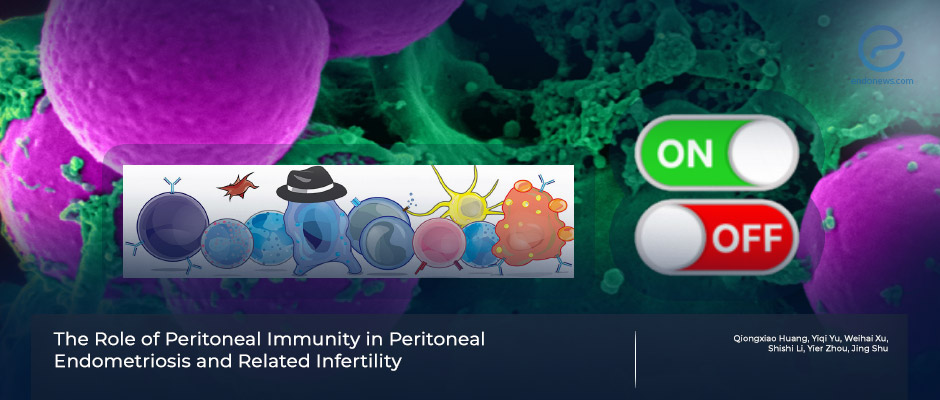Peritoneal endometriosis and Peritoneal Immunity
Sep 29, 2023
The peritoneum is an important immune barrier.
Key Points
Highlights:
- The organ-specific antibodies, such as anti-ovary, anti-theca, anti-sperm, anti-endometrial antibodies, etc., had been held responsible for developing endometriosis-related infertility.
Importance:
- The dysfunction of the immune system plays a significant role in the occurrence and progression of peritoneal endometriosis, and also in endometriosis-related infertility.
What's done here:
- Dr. Shu and his team from China penned this review to summarize the role of peritoneal immunity in the occurrence of peritoneal endometriosis, and its role as the cause of infertility.
Basic outlines:
- Increasing evidence reveals that immune disturbance is a significant factor in the occurrence and progression of endometriosis. The decisive factor is the high number of lymphocytes found in endometriotic lesions.
- Normally, peritoneal immunity is balanced and contains a variety of immune cells (B and T lymphocytes, macrophages, mast cells), where the balance of M1/M2 macrophages keeps the body homeostasis.
- An increase of M2 macrophages with decreased phagocytic capacity, reduced cytotoxicity of Natural Killer cells, simply an altered inflammatory process and immune imbalance are present in peritoneal endometriosis.
- Tryptase (a specific marker of mast cells), may affect sperm motility, causing a decreased fertility rate. The increased number of degranulated mast cells and significantly elevated tryptase activity were found in the peritoneal fluid of patients with endometriosis.
- The role of various inflammatory factors, such as interleukins, interferon, tumor necrosis factor, cytokines, etc., has been studied extensively. Most of these studies speculate relations of them with the progression of endometriosis.
Lay Summary
The peritoneum is an important immune barrier where, under normal conditions, it is balanced. External stimuli cause pro-inflammatory responses. To bring balance to this undesired situation, anti-inflammatory factors come into play. However, in patients with endometriosis, cytotoxicity of T lymphocytes, cytokines secreted by T helper, and autoantibody produced by B lymphocytes are reduced due to fragmented endometrial tissues. The question is the role of the altered immune microenvironment in the peritoneum in explaining the peritoneal endometriosis and the infertility of those patients.
Dr.Shu and his team from the Department of Reproductive Endocrinology of Hangzhou Medical College, China, aimed to explain the relationship between peritoneal immunity and the development of peritoneal endometriosis and infertility, focusing especially on molecular mechanisms.
During retrograde menstrual flow, the peritoneal fluid usually clears the endometrial debris entering the peritoneal cavity. However, those cells that escape peritoneal clearance can adhere to the peritoneal mesothelium and can obtain the ability to invade the matrix. This mechanism is called "immune evasion," it is not yet clear whether the subsequent complex immune dysregulation in the peritoneal cavity is the cause of endometriosis progression. The altered balance of immune cells, specifically an increase of M2 macrophages with decreased phagocytic capacity, and reduced cytotoxicity of Natural Killer cells, resulting in an immune imbalance is present in peritoneal endometriosis. Concerning organ-specific antibodies such as anti-ovary, anti-theca, anti-zona-pellucida, anti-sperm, and anti-endometrial antibodies, the current literature points out the relation with endometriosis-induced infertility, but they are not significant yet.
In this review was recently published in Frontiers Bioscience (Landmark ed), the authors` conclusion was that "The peritoneal immune cells and their products as cytokines are important research areas to reveal the immunologic pathogenesis of endometriosis in the future".
Research Source: https://pubmed.ncbi.nlm.nih.gov/37664916/
immune lymphocyte macrophage peritoneum endometriosis macrophage M1 M2 NK cells

